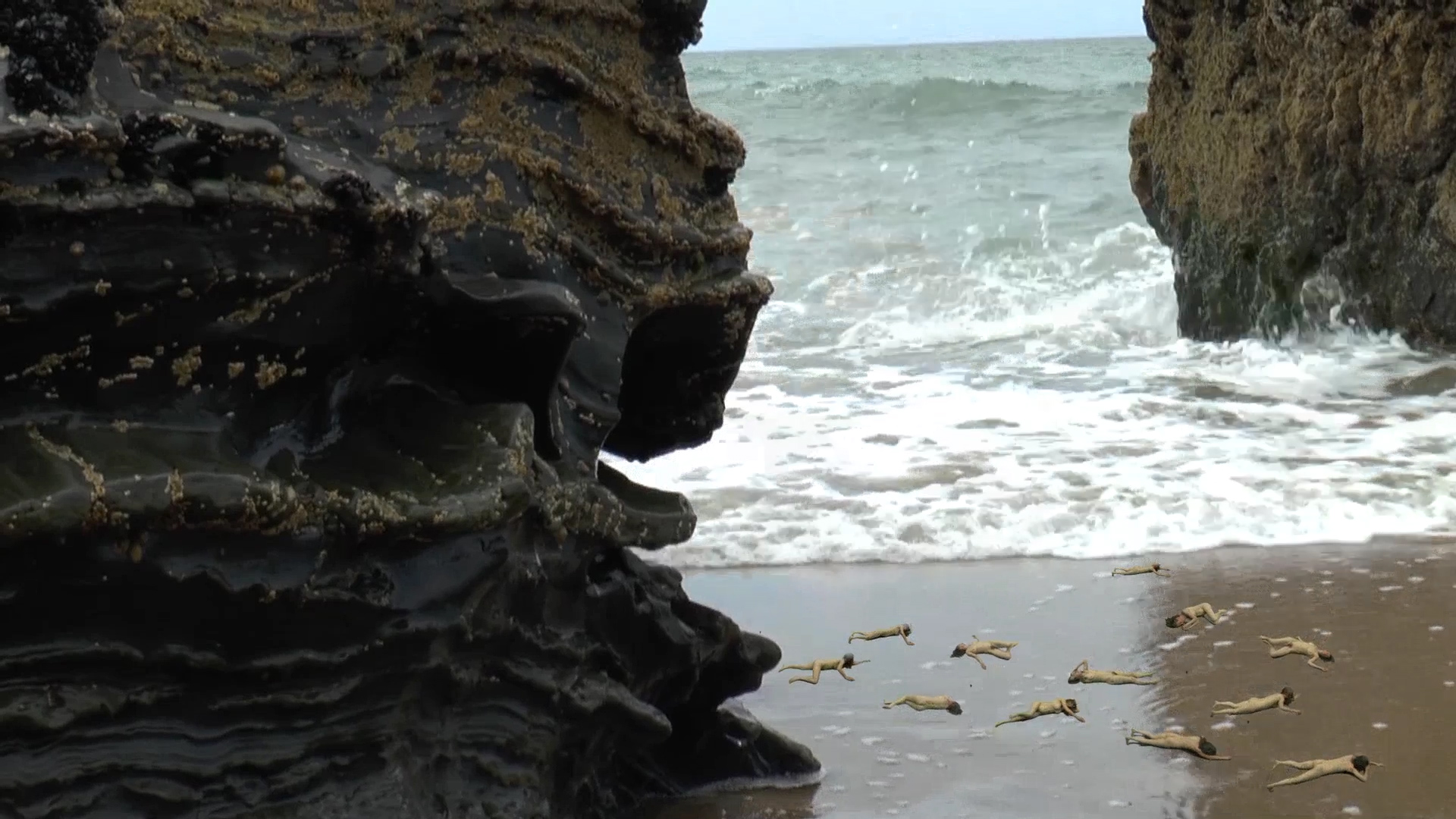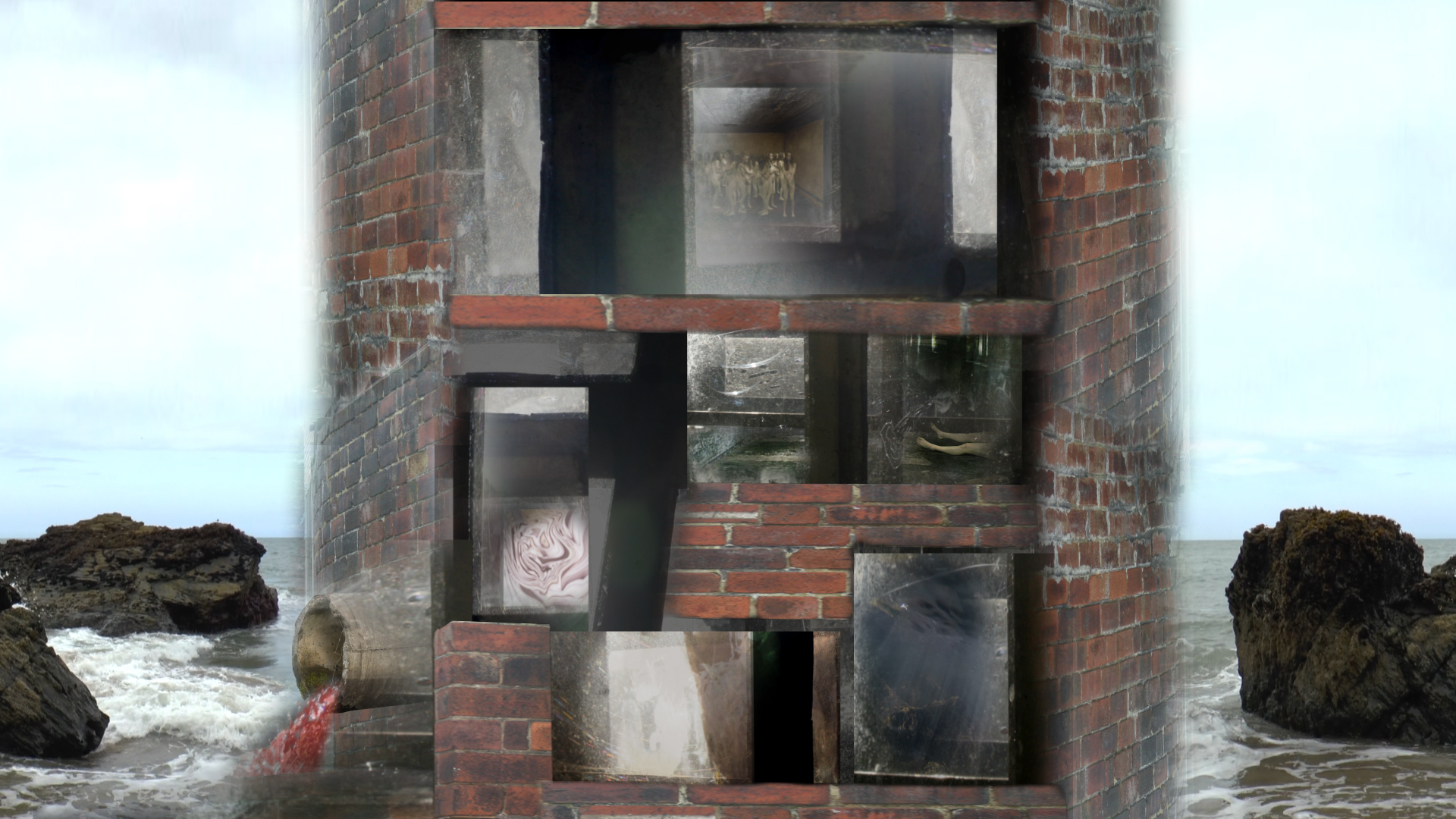
J. G. Ballard’s short story Billennium, from the Terminal Beach anthology, is set in the future at a time when the allocated living space for people is about to be changed from four meters square to three meters square. In Ballard’s over populated world he describes people getting into pedestrian jams where they become stuck in the midst of crowds moving in different directions. Sometimes people are stuck for days, being fed by others as they skirt the jam. There is no traffic in this world; vehicles became redundant long ago as there was not space for them to move. Yet in Ballard’s Billennium there is still an incentive to breed as a family cubicle has a slightly higher space ratio than a single person’s allowance.
Prof. Albert Bartlett tells us that by the year 2600, at the current population growth rate, there would be enough room for everyone to have a square metre each.1 Bartlett says that before that state is reached clearly something will have to be done. I am struck by the seemingly innocent but chilling statement — something will have to be done.
China imposed a single child policy in 1978 until last year. It is highly controversial as population control is against human instinct and basic human rights. It is also disputed as to whether it was effective since neighbouring countries also saw a birth rate decline ostensibly due to economic factors. The inherent sexism of the preference for boys over girls with the alleged killing of girl babies is cited as a reason for the failure of this policy. Yet the imbalance in the sexes that was created by this is now contributing to slower growth rate. China now faces what is referred to as the 4:2:1 problem, one child supporting two parents and four grandparents.
It’s possible that the population is self-controlling, but this isn’t known. During a bout of post-concussive syndrome following a head injury in 2012, a condition that manifested in episodes of fixation and anxiety, I was concerned that war was a natural and inevitable consequence of population growth and the devastating losses in the two world wars last century were phenomena following expansion since the industrial revolution.
I’m still not sure this isn’t the case. Capitalism promotes growth. Capitalism is arguably a system that exposes humankind’s tendency to expand and consume. The more people, the bigger the workforce and the bigger the consumer population. The question remains whether anything can be done about this, whether humankind has the capacity to change, which amounts to an issue of agency versus automaticity.
My research explores the uncanny and hauntology. In the briefest terms, the uncanny is an emotional state, a class of fear, where the source of the fear is not apparent. It implies that there is something veiled and hidden coming into view. Freud cited the castration complex as causing the uncanny sensation in his 1919 article ‘Das “Unheimlich”’ but also suggests that it is more generally the return of the repressed that produces uncanniness.2 Freud’s two major complexes, the castration and the Oedipal complexes, refer to the inclination both to breed and to kill, and it is these the individual represses. This requirement for social co-existence is not solely a feature of human behaviour.
Jacques Derrida’s concept of hauntology, that combines haunting and ontology, is a critical figuration concerned with the nature of being but with added spectres, whose first visit is always a return, a haunting, like the return of the repressed. Both hauntology and the uncanny include the idea of repetition as well as something hidden from view. This rather pessimistically suggests that the only thing we learn from our mistakes is that we will repeat them.

Since the pioneering work of Benjamin Libet in 1985 implied that agency was merely post-hoc confabulation, the question as to whether consciousness also amounts to an ability to instigate change, or whether it offers the capacity to reflect upon the instinctual mechanisms that drive humankind, without the ability to effectively act, remains unanswered.3 The contemporary relevance of the uncanny and hauntology converges around the question of agency, instinct, and the anthropocene, the geological term for the current era beginning with the industrial revolution defined as the point from which humankind began to have a major impact on the planet.
The uncanny describes the feeling associated with the return of that which we would rather not know. Hauntology describes our times, characterised by that which we would rather not know pushing forward by the sheer weight of its needing to be addressed.
Mark Fisher in Ghosts of my Life, from 2014, sees hauntology as a descriptor of these times, characterised by a plethora of mental illness and anxiety for the future. It is undeniable that the digital age has given us access to information not previously so easy to come by. The foundation of Fisher’s interpretation of hauntology is the suggestion of a collective anxiety resulting from the unavoidable awareness of impending global crises, coupled with a reluctance to address these issues and a sense of hopelessness.
The film Unhomely Street begins with a statement from political activist Stephen Bollom suggesting that current times are characterised by people being so frightened by the enormity of what’s going on around them that they don’t want to talk about things.4 If this is the case, given that it is difficult not to know about the current state of the world, the outcome will be one of collective anxiety. There could be an argument for not discussing these contemporary issues if our action is underpinned by instinct and not subject to our conscious will, but this question of automaticity versus agency remains unanswered.
This sentiment is shared by The Dark Mountain Project, a network of writers, artists and thinkers who see that the world is entering an age of ecological collapse, material contraction, and social, and political unravelling. Their manifesto states an intention to see cultural responses reflect this reality rather than denying it.
Creativity remains the most uncontrollable of human forces: without it, the project of civilisation is inconceivable, yet no part of life remains so untamed and undomesticated. Words and images can change minds, hearts, even the course of history.5
My intention here of contributing to a difficult dialogue that already grows in YouTube lectures, artist manifestos and conference calls, through the two installation projects, Wardrobe (War Machine) and Shore, stems from a conviction that art promotes a form of communication that is innate, pluralistic in meaning, and capable of revealing hidden dimensions of thought. Whether what is at stake is our action or our ability to deal with outcomes, a human, or species centred viewpoint borne of dialogue must be seen as a deterritorialising approach.6
...
1 Albert Bartlett, Arithmetic, Population, and Energy, <https://www.youtube.com/watch?v=sI1C9DyIi_8 > [accessed 13 December 2015].
2 Sigmund Freud, ‘The “Uncanny”’ (1919), in The Standard Edition of the Complete Psychological Works of Sigmund Freud, vol. 17, trans. and ed. by James Strachey et al., (London: Hogarth, 1955).
3 Benjamin Libet demonstrated that unconscious processes initiate volitional acts. He used an electroencephalogram (EEG) to record neuronal activity alongside an electromyograph (EMG) to record muscle movement in a button pressing experiment that showed muscle activity preceded conscious intension. Libet ’s experiment has been variously interpreted and criticised but, as described by Patrick Haggard atThe New Scientist Live: Consciousness conference, London: (the British Library, 12th September 2015) further research has shown that rather than consciousness being post-hoc confabulation, the decrease in discrepancy between response time and perceived action when choice is introduced into the experiment point to a more likely account that free-will and conscious intention are a part of human behaviour but the degree to which our actions are largely unconscious motor responses shouldn't be underestimated. See B. Libet, ‘Unconscious cerebral initiative and the role of conscious will in voluntary action’, Behavioural and Brain Sciences, Vol. 8, 529–566, (1985), and John A. Bargh and Melissa J. Ferguson, ‘Beyond Behaviourism: On the Automaticity of Higher Mental Processes’, Psychological Bulletin, (2000), Vol. 126, No. 6, 925–945.
4 Unhomely Street, dir. Susannah Gent, 2016.
5 Paul Kingsnorth, Uncivilisation: The Dark Mountain Manifesto, <http://dark-mountain.net/about/manifesto> [accessed 24 September 2016].
6 Gilles Deleuze and Felix Guattari, Anti-Oedipus: Capitalism and Schizophrenia, trans. by Robert Hurley, Mark Seem and Helen R. Lane (Minneapolis: University of Minnesota Press, 1983) [L'Anti-Oedipe, Paris: Les Editions de Minuit, 1972].
Bibliography
Ballard, J. G., ‘Billennium’, Terminal Beach, (Harmondsworth: Penguin, 1964), pp. 177–193.
Deleuze, Gilles and Felix Guattari, Anti-Oedipus: Capitalism and Schizophrenia, trans. by Robert Hurley, Mark Seem and Helen R. Lane (Minneapolis: University of Minnesota Press, 1983) [L'Anti-Oedipe, Paris: Les Editions de Minuit, 1972]
Freud, Sigmund, ‘Beyond the Pleasure Principle’, in The Standard Edition of the Complete Psychological Works of Sigmund Freud, vol. 18, trans. and ed. by James Strachey et al., (London: Hogarth, 1955).
——, ‘The “Uncanny”’ (1919), in The Standard Edition of the Complete Psychological Works of Sigmund Freud<, vol. 17, trans. and ed. by James Strachey et al. (London: Hogarth, 1955).
Massey, Irving, The Neural Imagination: Aesthetic and Neuroaesthetic Approaches to the Arts, (Texas: University of Texas Press, 2009).
Withy, Katherine, Heidegger: On Being Uncanny, (Cambridge, MA: Harvard University Press, 2015).
Whyte, Lancelot Law, The Unconsciousness Before Freud, (London: Tavistock Publications, 1962).
Bargh, John A. and Melissa J. Ferguson, ‘Beyond Behaviourism: On the Automaticity of Higher Mental Processes’, Psychological Bulletin, 2000, Vol. 126, No. 6, 925–945.
Bartlett, Albert, Arithmetic, Population, and Energy <https://www.youtube.com/watch?v=sI1C9DyIi_8> [accessed 13 December 2015].
Haggard, Patrick et al., Consciousness Conference: The New Scientist Live, (London: The British Library, London, 2015).
Kingsnorth, Paul, et al.,Uncivilisation: The Dark Mountain Manifesto <http://dark-mountain.net/about/manifesto> [accessed 24 September 2016].
LePage, Michael, ‘After the Fall, The Big Questions’, The Collection, New Scientist, issue 1, (2015), 72–77.
Libet, B, ‘Unconscious cerebral initiative and the role of conscious will in voluntary action’,Behavioural and Brain Sciences, Vol. 8, (1985), 529–566.